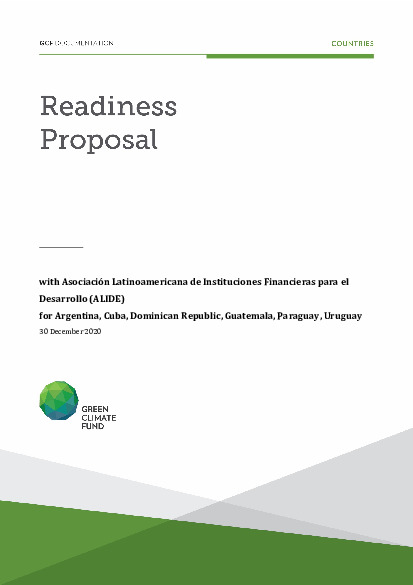Enhancing climate finance and investment in LAC banking sector
The Financial Sector plays a fundamental role in mobilizing the resources necessary to finance a low carbon economy, both through their activity as financial intermediaries, and in their role within the creation and placement of negotiated instruments in the markets. On the other hand, banks may be exposed to transition risks through their investments and loans in carbon- intensive assets, the so-called “Carbon Asset Risk”; and they can be affected by the negative consequences on the economy of, for example, an abrupt transition. Banks also face the physical risks of climate change, both directly (operational risk) and indirectly, through their portfolio (credit and market risk), depending on the location of their assets and their sector diversification and/or the insurance of these.
Although it is considered that the financial institutions of the region have responded proactively to the challenge imposed by climate change and that there is a tendency in the banking sector entities to develop “green products” aimed at achieving sustainability results, it is considered that they are still isolated initiatives, not systemic or integrated ones, that fail to trigger significant climate outcomes at national and/or regional levels. These processes undertaken individually by banking or financial entities could be strengthened through a regional approach that identifies barriers and opportunities for the climate financial business, while generating exchange of successful experiences, as well as mechanisms for monitoring and following up impacts, thereby facilitating the step towards a new generation of innovative climate financial instruments from and for the region, including both the development and commercial-private banks.
The Latin American Association of Financial Institutions for Development (ALIDE) has established itself as the main regional forum to generate banking solutions for the development of Latin America and the Caribbean. In the last 5 years, and in the context of a strategic alliance with the IDB, it has been systematically developing a series of actions in the field of Environmental and Climate Financing, positioning itself as a key partner for updating and exchanging climate finance knowledge. As regional reference institution for the banking sector, ALIDE has the networks to convey both public and private banks to increase their engagement in climate finance and work collaboratively with the national designated authorities (NDAs) to the GCF.
In response to this institutional path in climate finance issues, a group of 6 countries: Argentina, Cuba, Dominican Republic, Guatemala, Paraguay, and Uruguay, has decided to collaborate with ALIDE in the development of a Readiness regional project proposal on Climate finance for submission to the Green Climate Fund (GCF). The objective of the project is to generate evidence on the opportunities and challenges to implement innovative solutions for climate finance, focusing on 3 main lines of action:
- The project emphasizes on supporting potential Direct Access Entities to assess their portfolio on climate change and meet GCF accreditation process standards, while mobilizing interest of national sustainable finance platforms to engage with GCF and climate finance opportunities. This includes updating a regional overview on the state of the art of climate finance in Latin America and recommendations to improve ambition, investment scale and exchange of experiences across the sector, emphasizing in opportunities to engage with the GCF.
- Streamlining Financial Institutions involvement in NDCs and Country Programme implementation processes, by producing situational analysis and recommendations for portfolio prioritization at the regional/national scale, pilot experiences and submission of Concept Notes to the GCF.
- Promotion of joint investments and strategic alliances among FIs and AEs, testing pertinence of special vehicle purposes, private public partnerships (PPPs), green bonds and other innovative financial mechanisms for climate investment at scale in Latin America.
The main beneficiaries of the Project are firstly the entities of the Financial System, this includes regulators (i.e., Central banks, banking supervisors, etc.); banking sector (commercial and national development banks); and private sector (institutions in the private sector dealing with climate investments).
